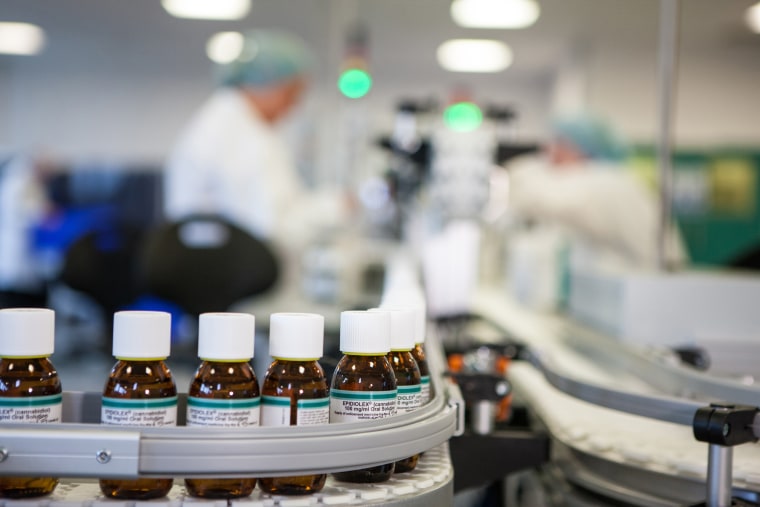FDA approves cannabis-based drug CBD for epilepsy
Epidiolex is made using cannabidiol but doesn't contain high-inducing THC.
by Maggie Fox
Bottles of Epidiolex.Tim Platt / Greenwich Biosciences
The Food and Drug Administration approved the prescription cannabidiol medicine Monday to treat rare and severe forms of epilepsy.
FDA Commissioner Dr. Scott Gottlieb also issued an immediate statement saying this wasn’t an approval of marijuana, in general — and said anyone wanting to use cannabis-based products to treat disease must prove they are safe and that they work.
The new drug, Epidiolex, is a formulation of cannabidiol — CBD for short. It’s derived from cannabis but doesn’t contain the THC that recreational users value for providing “highs."
“The difficult-to-control seizures that patients with Dravet syndrome and Lennox-Gastaut syndrome experience have a profound impact on these patients’ quality of life,” said the FDA’s Dr. Billy Dunn.
“In addition to another important treatment option for Lennox-Gastaut patients, this first-ever approval of a drug specifically for Dravet patients will provide a significant and needed improvement in the therapeutic approach to caring for people with this condition.”
The approval only covers use of the liquid drug for Lennox-Gastaut syndrome and Dravet syndrome. FDA advisers recommended the approval in April.
It is not a go-ahead for other marijuana-based products, Gottlieb stressed.
“This is an important medical advance,” he said. “But it’s also important to note that this is not an approval of marijuana or all of its components. This is the approval of one specific CBD medication for a specific use.”
It’s very different from using pure cannabis in any form.
“This is a purified form of CBD. It’s being delivered to patients in a reliable dosage form and through a reproducible route of delivery to ensure that patients derive the anticipated benefits,” Gottlieb said.
Many companies sell cannabis-based treatments, touting them as cancer cures, pain relievers and anxiety medicines. The FDA has been warning the public against falling for these unproven claims.
“The promotion and use of these unapproved products may keep some patients from accessing appropriate, recognized therapies to treat serious and even fatal diseases,” Gottlieb said.
He said the FDA would review legitimate applications for approval but said the agency needed solid scientific studies that demonstrate whether a product actually works and is safe.
“Such a process ensures that any new therapies from marijuana and its constituents are safe, effective and manufactured to a high and consistent quality and most importantly, that these products have been proven safe and effective for patients,” Gottlieb added.
The drug has been shown to reduce seizures and return a few children to near-normal function.
Dravet syndrome is a rare genetic condition that usually shows up in infants, starting with fever-related seizures and progressing to other, more severe seizure types.
“Children with Dravet syndrome typically experience poor development of language and motor skills, hyperactivity and difficulty relating to others,” the FDA said.
Lennox-Gastaut syndrome also causes seizures, usually starting in children aged 3 to 5. “Almost all children with Lennox-Gastaut syndrome develop learning problems and intellectual disability,” the FDA said.
“Many also have delayed development of motor skills such as sitting and crawling. Most people with Lennox-Gastaut syndrome require help with usual activities of daily living.”
Medical marijuana is legal in 29 states, Guam and Puerto Rico. Studies have shown that it can have some benefits in reducing anxiety, counteracting some types of nausea, and that it may relieve some symptoms of glaucoma and multiple sclerosis.
The FDA has approved several marijuana-based products, including the synthetic formulation Marinol, prescribed to treat severe appetite loss and nausea in conditions such as AIDS. But marijuana products in general are subject to Schedule I restrictions by the Drug Enforcement Administration (DEA) because of the potential for abuse.
Greenwich Biosciences, the U.S. subsidiary of GW Pharmaceuticals, will sell the product.
"As part of the approval process, Epidiolex must be rescheduled from its current Schedule I before it can be made available to patients," the company said in a statement. "Rescheduling is expected to occur within 90 days."
No comments:
Post a Comment